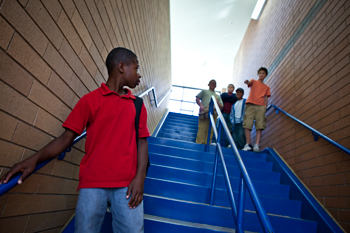Childhood Bullying May Lead to Grown-Up Problems
October 2014
Childhood Bullying May Lead to Grown-Up Problems
Being bullied isn’t something most children want to talk about. Yet, 1 out of 4 children report such peer abuse. The immediate result is low self-esteem and depression. These negative health effects and others may even linger into adulthood.
Lasting health problems
When you think of bullying, you may picture a child or a group of children physically hurting another child. But bullying can take many forms. It can include constant teasing, rumor spreading, and name calling. Excluding a child from a group or activity is another type.
Ongoing research shows that bullying of any kind can damage a child’s health. Many children who are bullied suffer from anxiety and depression. Some even have physical illness. For instance, they may have stomachaches, headaches, and problems sleeping or eating.
Could these health concerns last into adulthood? That’s what a recent study in the journal JAMA Psychiatry suggests. Researchers interviewed more than 1,400 children between ages 9 and 13. The children answered annual questionnaires about bullying and their health until age 16. The researchers then followed up with study participants when they were in their early to mid-20s.
Bullying may well have lasting health effects. And surprisingly not just for the victims. Those who were bullied—and even the bullies themselves—were much more likely to report mental health issues in early adulthood. Many struggled with depression and panic disorder. Even more concerning: They were more prone to thoughts of suicide.
Signs of bullying
Bullying may be bad for your child’s health. But there is good news: A recent survey shows it may be on the decline, at least among teenagers. Even so, it’s still important to watch for the warning signs. Many children won’t speak up if they are being bullied. They may feel embarrassed or helpless.
Your child may be a victim of bullying if he or she:
Seems withdrawn or isolated from others
Comes home with unexplained injuries
Loses personal items, such as jewelry or electronics
Complains about frequent headaches, stomachaches, or other physical problems
No longer wants to go to school or hangout with certain people
Changes eating or sleeping habits
Talks about suicide or harms himself or herself
If you think your child is being bullied, talk with him or her right away. Simply asking about school or fellow classmates may help start the discussion.
To protect your child, teach him or her how to properly deal with a bully. Bullies tend to pick on shy or weaker children. Your child may be able to diffuse the situation by looking the bully in the eye and firmly telling that person to stop. Also encourage your child to make new friends and seek help if he or she is being bothered.
October is National Bullying Prevention Month. Visit www.stopbullying.gov for more ways to protect your child against bullying.
Online resources
Updated:
March 21, 2017
Sources:
Adult Psychiatric Outcomes of Bullying and Being Bullied by Peers in Childhood and Adolescence. W. Copeland, et al. JAMA Psychiatry. 2013;70(4):419-26., Bullied Children and Psychosomatic Problems: A Meta-Analysis. G. Gini and T. Pozzoli. Pediatrics. 2013;132(4):720-9., Peer Victimization in Fifth Grade and Health in Tenth Grade. L.M. Bogart, et al. Pediatrics. 2014;133(3):440-7., Trends in Bullying, Physical Fighting, and Weapon Carrying Among 6th through 10th-Grade Students from 1998 to 2010. J.G. Perlus, et al. American Journal of Public Health. 2014;104(6):1100-6.
Reviewed By:
Turley, Ray, BSN, MSN
